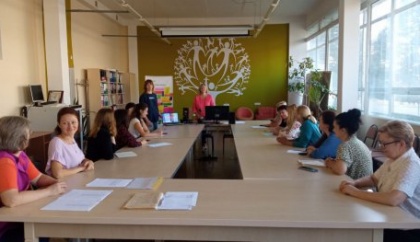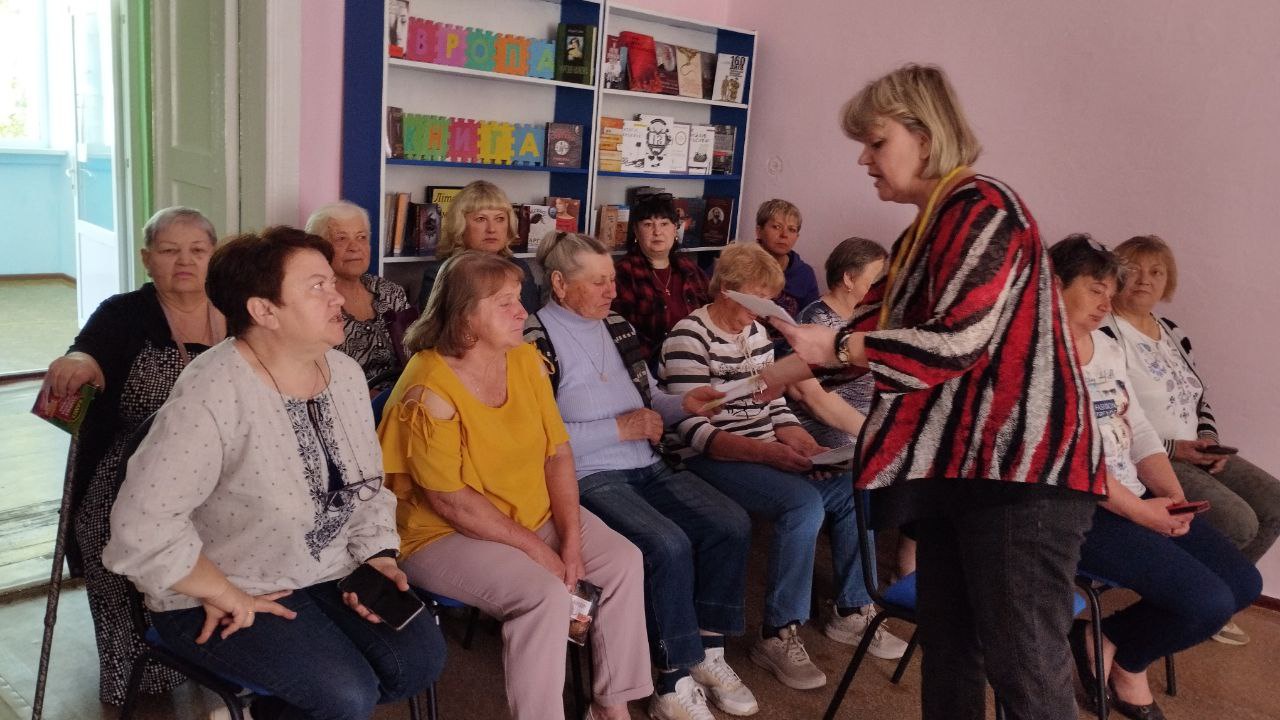
The war with Russia goes beyond the battlefield. Our information environment is also under constant attacks. Critical thinking, conscious consumption of information, and media literacy are among the prerequisites for the survival of our country and its ability to resist the aggressor. Meanwhile, according to a research by the NGO Detector Media, only 14% of Ukrainians have a high level of media literacy.
Reprinted from Dankor online.
Helping senior citizens recognize fakes and disinformation and teaching them the rules of responsible information consumption were the goals of the initiators of the advocacy campaign “Culture of Content Consumption. Don't Trust It – Check It” in Shostka, Sumy region.
For 9 years, the city central library has been hosting the “Promin” documentary film club, which is a member of the DOCU/CLUB Network of the NGO Docudays. Anzhelika Penkina, the film club moderator, has been gathering viewers from Shostka and the villages of its territorial community for screenings and discussions of documentaries and media literacy classes for half a year now.
Did they succeed in teaching seniors how to protect themselves from manipulative technologies and recognize fake news? How does increased media literacy affect their lives? Anzhelika Penkina, moderator of the “Promin” film club at the Shostka City Central Library, told us about this.
“Many internally displaced persons from Kharkiv, Donetsk, and Luhansk regions, as well as from the border towns and villages of Sumy region come to Shostka. They attend our film club, watch documentaries, and join the conversations and discussion of films. During such discussions, I’ve noticed that many of them do not really follow the news, often perceiving fakes as real news. It is especially dangerous when such disinformation is spread by our enemy,” says the film club moderator. “Young people are better aware of this issue and generally more informed, but it is more difficult for older people. So my colleagues and I decided that we needed to help them understand how to identify and verify the accuracy of information.”
The idea to launch a media literacy advocacy campaign in Shostka came about during the screening of Bellingcat: Truth in a Post-Truth World by Dutch director Hans Pool at the film club. The story of a team of civil investigative journalists who use open sources to look into high-profile cases, find facts, and fight for the truth prompted the moderator to develop a plan for meetings and training in communities. She was able to implement this plan with the support of the DOCU/CLUB Network.
Anzhelika Penkina decided to focus on working with seniors: “There is a social stereotype that working with them is harder, since it is more difficult for them to change their established habits and beliefs. This is partly true – work with seniors is more challenging and more interesting at the same time. You should see how their eyes light up when they understand the issue! Believe me, sometimes even children don't react like older people. They were so inspired by their new knowledge that they wanted to accompany us to film club meetings in the villages of the community. I saw how much they lack attention and information.”
The initiator of the campaign, together with media literacy expert Halyna Moskalenko, used the methodological advice for film club moderators to make the training as interesting and informal as possible: they not only lectured about the theory, but also played media literacy games with their “students,” screened documentaries from the DOCU/CLUB Network's collection, and discussed the use of manipulative technologies using the films as examples.
“I am delighted when senior citizens start to confidently navigate the information space and use new knowledge in their everyday lives,” admits Anzhelika Penkina. “They tell their neighbors about it, hold mini-lectures on benches in their yards, and bring their relatives and friends to the meetings. In September, we met with Oksana Moroz, the founder of the information hygiene initiative ‘How Not to Become a Vegetable.’ I did not expect that so many people would want to join. There were many new faces, and I realized that a lot of work still awaits us.”
Anzhelika Penkina plans to spread this knowledge to all villages in the community. She says that the locals are eager to come to local libraries to meet with her: “In the cities, people are overwhelmed with events, but in the countryside, they are not. Normally, everyone is afraid to come so close to the border and organize anything here, and then suddenly a film club arrives. It is really touching: these people dress up, sit respectfully, like in old films, and it's a celebration for them. Sometimes we have to screen a film on a small laptop screen because there is no electricity or we have to proceed to a shelter, but they still sit in silence and look at the screen attentively. The discussions, in their turn, are really heated! It's very interesting. One meeting is usually not enough, so we are invited to come back. If they wait for us, we will definitely come again.”

The advocacy campaign “Culture of Content Consumption. Don't Trust It – Check It” resulted in the development of a media literacy training program to be implemented at libraries in the Shostka community. The city council will consider the proposal to adopt the program at the end of the year. Anzhelika Penkina is confident that the media literacy school will be included in the community's socio-economic and cultural development program for 2025-2027, meaning that the work on improving media literacy will be systematic and incessant.
“We don't wait for the program to be approved – we keep working regardless. In winter, it's hard to travel to villages, and some of them lack public transport. By the spring, we will start traveling again,” says the moderator. “But there is enough work in Shostka as well. People have already heard about our program, and now students are contacting us, and local colleges and vocational schools are asking us not to forget about them. The issue is very important, so I plan to start discussing it with youths as well.”
Anzhelika Penkina explains the active interest of people in this media education initiative as follows: “Documentary films help me convey information. They turn a dry lecture into a lively discussion. They make discussions of serious issues easier and more interesting for the audience. I have long been in love with the film club work, with our films. They change people, their consciousness, and their attitude to life. People learn to become responsible. I am convinced this is the way to achieve genuine changes in the country.”
Photos from the archive of Anzhelika Penkina.
The development of the DOCU/CLUB Network is funded by the United States Agency for International Development (USAID), the Embassy of Sweden in Ukraine, the National Endowment for Democracy (NED) and Fondation de France.
The opinions, conclusions, or recommendations are those of the authors and compilers of this publication and do not necessarily reflect the views of the governments or charitable organizations of these countries. The authors and compilers are solely responsible for the content of this publication.
All news


